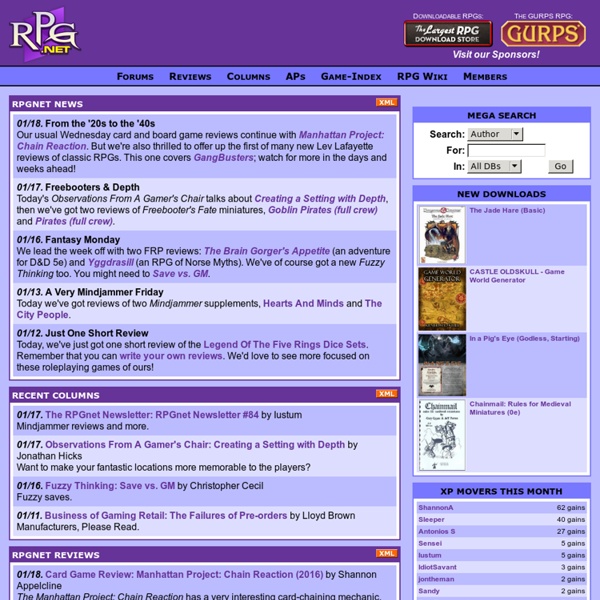



Role Play Media Network - a community for rpg bloggers, podcasters, vidcasters, and their audiences Apocalypse World The Hypertext d20 SRD (v3.5 d20 System Reference Document) Lizard's Gaming and Geekery Site | Old School Attitude? Modern Rules The Alexandrian - Misc Creations Mystery scenarios for roleplaying games have earned a reputation for turning into unmitigated disasters: The PCs will end up veering wildly off-course or failing to find a particular clue and the entire scenario will grind to a screeching halt or go careening off the nearest cliff. The players will become unsure of what they should be doing. The GM will feel as if they’ve done something wrong. And the whole evening will probably end in either boredom or frustration or both. Here’s a typical example: When the PCs approached a murder scene they don’t search outside the house, so they never find the wolf tracks which transform into the tracks of a human. They fail the Search check to find the hidden love letters, so they never realize that both women were being courted by the same man. As a result of problems like these, many people reach an erroneous conclusion: Mystery scenarios in RPGs are a bad idea. Or, as someone else once put it to me: “The players are not Sherlock Holmes.” A.K.A.
From the Dungeon to the Dictionary From the Dungeon to the Dictionary I recently received an e-mail from a correspondent who noted that my list of forms of government lacked the word magocracy . This revelation left me, if not shaken to my lexicographic foundations, then at least perplexed that I had possessed in my vocabulary for many, many years a word that simply did not exist. The answer is that for over twenty years, I have been a participant in role-playing games (RPGs), most notably Dungeons and Dragons (usually abbreviated to D&D), an extremely popular game with millions of players worldwide (mostly in their teens and twenties), and also one with its own curious jargon. Any sufficiently popular and complex hobby, game or sport will quickly develop its own cant, a mode of discourse that by its nature includes insiders and excludes others. magic-user ), his contribution, and more generally the contribution of Dungeons and Dragons, has been much more significant than generally recognized. The Words of the Game electrum .
The Alexandrian - Misc Creations An Essay by Justin Alexander I think every GM probably has a story about the time that they spent hours carefully detailing some piece of lore or a particularly intricate conspiracy... only to discover that their players didn't really care. Or you complete a dramatic and powerful series of adventures featuring the unraveling of a conspiracy wrought by the Dark Gods of Keht... but three months later you mention the name "Keht" and are met by blank stares from the players. But often -- even as you're meeting with this kind of frustration -- the players are still having a great time. They'll tell all sorts of tales about the time that their characters did X... and do you remember that time that Y did Z? In discussing this problem with other GMs, I've seen many of them come to the conclusion that players just don't care that much about the game world. Well, there's a grain of truth in that. Are you sure you actually want the players to know what's going on? "Third Lord of Castle Shard."
Technohol 13: Marvel Super Heroes RPG (Classic & Saga) Source Material Ben’s RPG Pile